Episodes
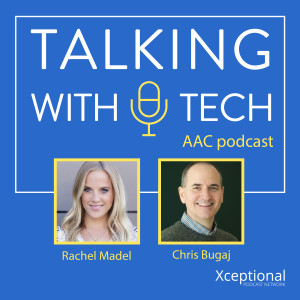
Thursday May 22, 2025
Thursday May 22, 2025
In this episode of Talking with Tech, Chris is interviewed by Adina Malamut, a graduate student and Employee Accessibility Specialist at the University of Texas at Dallas. Their conversation explores Adina’s professional background, her passion for accessibility, and her role in facilitating workplace accommodations. Chris shares insights from his extensive experience in assistive technology, discussing best practices for training, assessment, and systemic implementation of tools to support individuals with disabilities.
Key Ideas This Week:
Creative Versatility and Experimentation: Adina emphasizes the value of trying different styles and formats in her creative process, especially in comedy. She discusses how experimenting with diverse mediums—from writing and directing to performing—has helped her grow and connect more authentically with her audience.
The Power of Community and Collaboration: She highlights the importance of working with others in the creative field. Adina shares how collaborating with fellow artists and being part of supportive communities has enriched her projects and offered essential feedback and encouragement.
Personal Growth Through Vulnerability: A recurring theme is her willingness to be vulnerable in her work. She talks about how sharing personal stories and embracing imperfections not only deepens her connection with audiences but also contributes to her personal development as an artist.
Help us develop new content and keep the podcast going strong! Support our podcast at patreon.com/talkingwithtech!
Visit bit.ly/twtpod for access to previous episodes, resources, and CEU credits that you can earn for listening to TWT episodes!

Wednesday Apr 30, 2025
Wednesday Apr 30, 2025
In this episode, Christina Schmidt discusses the critical role of cultural competency in AAC, emphasizing the need to honor linguistic and cultural diversity, such as African American English, within communication systems. She highlights the importance of clinicians addressing their own implicit biases and taking a thoughtful, reflective approach when working with families. Christina encourages professionals to build trust gradually, prioritize collaboration, and empower both caregivers and clients to ensure AAC systems truly reflect the user's identity and culture!
🔑Cultural Competency and AAC Must Go Hand-in-Hand: Christina emphasizes the importance of recognizing and respecting cultural and dialectal diversity—especially African American English (AAE)—when programming and implementing AAC systems. Ignoring these cultural elements can undermine identity, communication authenticity, and trust between professionals and families.
🔑 Clinicians Must Address Their Own Implicit Biases: A foundational step in becoming culturally competent is self-reflection. Christina encourages professionals to examine and challenge their own internalized biases before engaging with families. This self-awareness ensures more respectful, equitable, and effective service delivery.
🔑 Building Trust Takes Time and Intention: Establishing a culturally responsive relationship with families—particularly those from marginalized backgrounds—requires patience, ongoing reflection, and intentional rapport-building. Clinicians are urged to create safe spaces, validate cultural expressions, and engage in continuous learning to truly support meaningful communication through AAC.
Help us develop new content and keep the podcast going strong! Support our podcast at patreon.com/talkingwithtech!
Visit bit.ly/twtpod for access to previous episodes, resources, and CEU credits that you can earn for listening to TWT episodes!

Thursday Apr 24, 2025
Thursday Apr 24, 2025
In this episode, Rachel Madel and Chris Bugaj recap their experiences at ATIA 2025, highlighting the value of community-building during the pre-conference and the growing impact of generative AI in AAC and assistive technology. They discuss exciting new tools like Symbol Creator AI and Flex Speak, and reflect on key sessions around policy advocacy, emphasizing the power of personal stories in influencing change. The episode underscores the importance of collaboration, innovation, and using your voice to make a difference in the assistive tech space.
Key Ideas This Episode:
Collaborative Learning and Connection at Pre-Conference and SessionsChris & Rachel emphasized how the ATIA pre-conference fostered rich conversations and collaboration, particularly for professionals who often feel isolated in the AAC field. Participants valued the chance to share insights, ask questions, and build lasting relationships. The extended format of 1.5 days allowed for deeper dives into topics like coaching and core AAC strategies, enhancing both learning and community-building.
Generative AI and Accessibility InnovationsA major theme was the evolving role of generative AI in assistive technology. Presentations explored how AI could enhance AAC use—like suggesting dialogue based on context or location (e.g., at Starbucks)—and improve communication speed and flexibility. Tools like Microsoft’s Accessibility Insights, the Flex Speak app for multilingual AAC, and Symbol Creator AI from Global Symbols were highlighted as promising developments that support more inclusive and customizable communication.
Empowerment Through Policy, Advocacy, and StorytellingAmidst concerns over funding and administrative changes, attendees were encouraged to advocate for assistive technology by directly engaging policymakers. A standout session by ATIA’s policy advisor Laura Kaloi underscored the impact of personal stories in influencing legislation. The episode closed with a reminder that every professional’s and user's voice matters in shaping future access and innovation in the field.
Help us develop new content and keep the podcast going strong! Support our podcast at patreon.com/talkingwithtech!
Visit bit.ly/twtpod for access to previous episodes, resources, and CEU credits that you can earn for listening to TWT episodes!
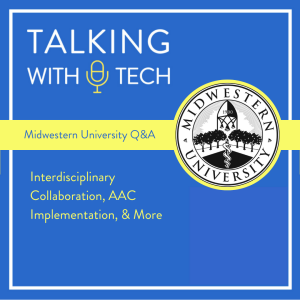
Wednesday Mar 12, 2025
Wednesday Mar 12, 2025
This week, we share Chris and Rachel’s Q&A session with Professor Danielle Reed and her students at Midwestern University. They discuss interdisciplinary collaboration, the importance of mindset in AAC implementation, how occupational therapists can work effectively with speech-language pathologists, and more!
Before the interview, Chris and Rachel touch on Chris’s experience teaching AAC to pre-service occupational therapy students, emphasizing interdisciplinary collaboration, mindset shifts, and the importance of making communication fun and engaging.
Key Ideas This Week:
🔑 The Biggest Challenge in AAC Implementation Is Training Communication Partners – The main difficulty in teaching kids to use Augmentative and Alternative Communication (AAC) isn't the child’s ability but rather ensuring that parents, teachers, and therapists consistently model and support its use. Overcoming resistance and misconceptions among adults is a crucial part of AAC success.
🔑 Collaboration and Buy-In Are Essential for AAC Success – When selecting an AAC system, it’s important to involve the entire team, including parents, therapists, and educators. A collaborative approach ensures better long-term implementation and prevents division in decision-making that could hinder the child’s progress.
🔑 Mindset and Education Over Restriction – A common mistake in AAC is limiting vocabulary or access based on assumptions about a child’s capabilities. Instead of restricting words or making assumptions about a child's abilities, the focus should be on providing access to robust language and educating both the child and communication partners to use it effectively.
Help us develop new content and keep the podcast going strong! Support our podcast at patreon.com/talkingwithtech!
Visit bit.ly/twtpod for access to previous episodes, resources, and CEU credits that you can earn for listening to TWT episodes!
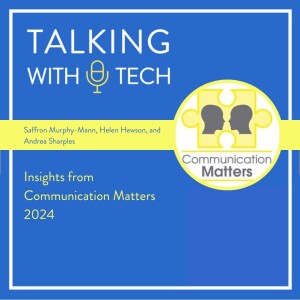
Wednesday Feb 19, 2025
Wednesday Feb 19, 2025
This week, we Share Chris’s interview with Saffron Murphy-Mann, Helen Hewson, and Andrea Sharples! Saffron Murphy-Mann is a specialist AAC teacher with a background in music, working in both mainstream and specialist settings to support young AAC users in accessing education and demonstrating their knowledge. Helen Hewson is an AAC user born with cerebral palsy, who has been using various forms of AAC since childhood and is now a trustee of Communication Matters, advocating for AAC awareness and supporting others on their communication journeys. Andrea Sharples is a speech and language therapist and the director of AT Therapy, an independent practice that provides AAC mentoring and support, employing AAC users with lived experience to inspire and guide others. All three are actively involved in Communication Matters, contributing to the organization’s mission of empowering AAC users and fostering a supportive community through conferences and advocacy!
Before the interview, Chris and Rachel discuss the balance between accessibility and privacy, particularly in the context of AAC devices and personal information. They explore concerns about exposing personal identifying information on devices and luggage tags, while also considering how to maintain security and accessibility for users with fine motor challenges, such as using strong passwords with tools like sticky keys.
Key Ideas This Week:
🔑 Empowering Individuals With AAC: Helen Hewson shared her personal journey with cerebral palsy and how AAC technology transformed her life, enabling her to communicate effectively and gain independence. Her story underscores the critical role AAC plays in breaking down barriers for individuals with communication disabilities, allowing them to express themselves, participate in education, and engage socially.
🔑 The Community and Inclusivity of the Communication Matters Conference: The CM conference is not just a professional gathering but a vibrant, inclusive community event that brings together AAC users, families, professionals, and manufacturers. The conference features a mix of educational sessions, social events (like the open mic night and fancy dress dinner), and opportunities for networking and collaboration.
🔑 The Growth of Communication Matters: The episode highlighted the growing popularity of the CM conference, which was sold out in 2024, and the plans to expand its reach in 2025, including attracting more international delegates and potentially hosting the largest AAC flash mob as a world record attempt!
Learn more about the Communication Matters International AAC Conference at https://communicationmatters.org.uk/conference
Visit talkingwithtech.org to listen to previous episodes, find new resources, and more!
Help us develop new content and keep the podcast going strong! Support our podcast at patreon.com/talkingwithtech!
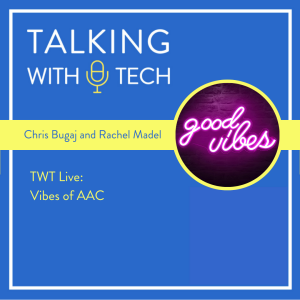
Wednesday Feb 05, 2025
Wednesday Feb 05, 2025
This week, we present our TWT Live episode, “Vibes of AAC”! TWT Live episodes include interactions with the audience, including feedback and questions. This week, Chris and Rachel discuss the critical role of modeling language for AAC users, emphasize the importance of coaching communication partners, and highlight the significance of fostering a mindset that supports literacy for all children!
Key Ideas this Week:
The Power of Inclusive AAC Events – The discussion about the open mic night at the Communication Matters conference highlighted the importance of creating inclusive, public spaces where AAC users can express themselves, perform, and interact with a diverse audience. This fosters greater awareness and acceptance of AAC communication in the wider community.
Privacy Considerations for AAC Users – The episode explored the issue of privacy for AAC users, particularly in public settings where others can see their message formulation. This raised important questions about how to support AAC users’ preferences for display and output features, balancing accessibility with personal privacy.
Coaching and Encouraging AAC Modeling – A major theme was the challenge of getting educators and caregivers to consistently model AAC use. The conversation emphasized the importance of coaching, structured support, and making AAC modeling a natural part of daily routines to help AAC users develop strong communication skills.
Visit talkingwithtech.org to listen to previous episodes, find new resources, and more!
Help us develop new content and keep the podcast going strong! Support our podcast at patreon.com/talkingwithtech!
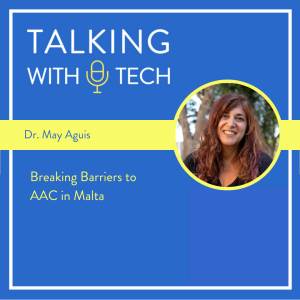
Wednesday Jan 29, 2025
Wednesday Jan 29, 2025
This week, Chris interviews Dr. May Aguis! Dr. Aguis is a speech and language therapist with the National Assistive Technology Team in Malta!, She is also involved with the World Health Organization as a member of their Assistive Technology Advisory Group, and serves as a lecturer at the University of Malta. Dr. Aguis shares about her doctoral work with AAC and her efforts to train teachers and develop AAC resources across Malta!
Before the interview, Chris and Rachel discuss the concept of “best” practices and why, in their opinion, using that phrase in the context of therapy can potentially be confusing, or even a turn off, to others.
Key Ideas this Week:
🔑 Redefining Communication Beyond Assistive Technology – Dr. Aguis challenges the traditional categorization of AAC (Augmentative and Alternative Communication) as merely a subset of assistive technology. She emphasizes that communication happens through multiple modes—gestures, symbols, and even digital expressions like emojis—highlighting the need for a broader understanding of AAC beyond just high-tech devices.
🔑 Interdisciplinary and Holistic Approaches to AAC – Effective AAC implementation requires collaboration across disciplines. Dr. Aguis discusses how occupational therapists, educators, and families play a crucial role alongside speech therapists. She also stresses the importance of addressing sensory needs before AAC intervention, particularly for autistic individuals, as sensory regulation significantly impacts communication success.
🔑 Global Challenges in AAC Accessibility and Language Representation – The discussion reveals disparities in AAC accessibility worldwide, particularly in languages like Maltese that lack text-to-speech technology. Dr. Aguis highlights the need for universal design in AAC systems and advocates for increased global efforts to ensure linguistic inclusivity in assistive technology.
Learn more about the Communication Matters International AAC Conference at https://communicationmatters.org.uk/conference
Visit talkingwithtech.org to listen to previous episodes, find new resources, and more!
Help us develop new content and keep the podcast going strong! Support our podcast at patreon.com/talkingwithtech!
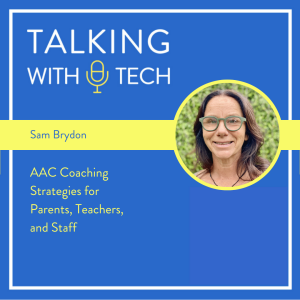
Wednesday Jan 22, 2025
Wednesday Jan 22, 2025
This week, we share Chris’s interview with Dr. Sam Brydon! Dr. Sam Brydon is a speech-language pathologist and researcher based in New Zealand who works with Torque Link, a nonprofit that conducts AAC assessments and provides support and training across the country. She balances this role with efforts to disseminate her doctoral research, which focuses on coaching and professional development for implementing AAC effectively!
Before the interview, Chris and Rachel dive into a great listener question. The listener has an 8-year-old child with cerebral palsy and cortical visual impairment who uses eye gaze to access his AAC device. They are considering adding more words to the device, but are unsure if this is a good idea. Chris and Rachel share why the family should follow their gut to push for more words on the device, highlighting the importance of presuming potential in every child.
Key Ideas This Week:
🔑 The Importance of Coaching in AAC Implementation: Dr. Brydon emphasizes that coaching, rather than simply delivering workshops or direct therapy, is crucial in supporting parents, teachers, and other communication partners to effectively implement Augmentative and Alternative Communication (AAC) strategies. Collaborative coaching that includes practice, feedback, and reflection is essential for lasting change.
🔑 Challenges and Solutions in AAC Adoption: She highlights barriers such as the misuse of AAC tools (e.g., as behavior management tools) and the difficulty communication partners face in mastering AAC strategies. Her research shows that success hinges on providing consistent, hands-on coaching to help partners integrate AAC into daily routines and interactions.
🔑 The Role of Motivation and Motor Planning: Dr. Brydon discusses the importance of ensuring AAC systems are motivating for children and that they utilize consistent motor planning. She notes that tools like core boards and approaches like LAMP (Language Acquisition through Motor Planning) can enhance accessibility and engagement for users.
Visit talkingwithtech.org to listen to previous episodes, find new resources, and more!
Help us develop new content and keep the podcast going strong! Support our podcast at patreon.com/talkingwithtech!
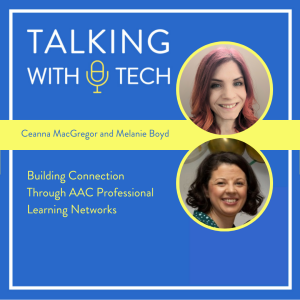
Wednesday Jan 15, 2025
Wednesday Jan 15, 2025
This week, we share Chris’s interview with Ceanna MacGregor and Melanie Boyd! Ceanna is an AAC specialist and teacher working with CALL Scotland, an organization that supports staff and pupils in overcoming barriers related to assistive and communication technologies. Melanie Boyd is an AAC consultant who runs her own consultancy called Communication Angel. Melanie's career shift into AAC was inspired by the communication needs of her daughter. Ceanna and Melanie share about their participation in the professional learning network, Scottish AAC Geeks, and some of the benefits they have both received participating in this group.
Before the interview, Chris and Rachel share a listener question about her son’s device being wiped, highlighting the need for multiple backups you can access if something happens to the AAC device.
Key ideas this week:
🔑 The Power of Collaboration and Networking in AAC (Augmentative and Alternative Communication): Ceanna and Melanie emphasized the role of collaboration in advancing AAC implementation. Their involvement in the Scottish AAC Geeks highlights how professional networks, even small ones, can create a supportive environment for sharing knowledge and fostering innovation in AAC practices.
🔑 Overcoming Barriers and Shifting Mindsets in AAC Implementation: A central theme was addressing the challenges of fixed or negative attitudes toward AAC. They focused on strategies to promote positive mindsets, such as sharing success stories and advocating for a culture of belief in the potential of AAC users.
🔑 The Role of Innovation and Personalized Support: The discussion highlighted exciting advancements like the integration of AI in AAC and computer environmental controls, which offer personalized solutions and greater independence for users. Ceanna and Melanie also emphasized the importance of providing ongoing support to users, their families, and educators to ensure sustainable AAC implementation.
Learn more about the Communication Matters International AAC Conference at https://communicationmatters.org.uk/conference
Visit talkingwithtech.org to listen to previous episodes, find new resources, and more!
Help us develop new content and keep the podcast going strong! Support our podcast at patreon.com/talkingwithtech!
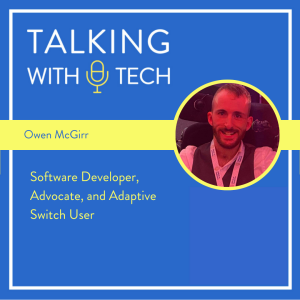
Wednesday Jan 08, 2025
Wednesday Jan 08, 2025
This week, Chris interviews Owen McGirr (enaboapps.com), a software developer who is a passionate advocate for accessibility in technology! Living with cerebral palsy and using adaptive switches himself, Owen has dedicated his career to creating tools that empower people with disabilities. His innovations include apps like Switchify (switchifyapp.com), which allows users to control Android devices with adaptive switches, and SayIt, an AAC app tailored for effective communication. Through his open-source projects and relentless drive, Owen is transforming technology to be more inclusive and empowering for all!
Before the interview, Chris and Rachel discuss why switches can be an overlooked option for AAC users with access issues. They stress the need for professionals to consider a variety of access methods, including switches, to ensure families are aware of all available options!
Key Ideas This Week:
Importance of Backup Systems: Rachel advocates for having a backup communication system, such as partner-assisted scanning, especially for users of eye tracking. She explains that eye tracking can be fatiguing, and having alternative methods ensures reliable communication.
The Role of AI in Development: Owen highlighted how generative AI plays a significant role in his work, aiding tasks like coding, debugging, and brainstorming. However, he emphasized that AI serves as a supportive tool requiring human oversight to ensure accuracy and functionality.
Empowerment Through Personalization: Owen’s journey with AAC devices underscores the importance of personalized technology. From starting with basic tools to creating solutions that suit his needs, he advocates for user autonomy in choosing the best tools and methods to empower users to communicate and interact with technology on their own terms.
Visit talkingwithtech.org to listen to previous episodes, find new resources, and more!
Help us develop new content and keep the podcast going strong! Support our podcast at patreon.com/talkingwithtech!

Join AAC experts Rachel Madel and Chris Bugaj as they dive into a weekly discussion about all things AAC (Augmentative and Alternative Communication). Every episode they deliver practical resources, clinical guidelines and relevant research to help clinicians better utilize technology for individuals with complex communication needs.
Episodes include interviews with industry thought-leaders, clinicians, parents, researchers and app developers to keep you on the pulse of the educational technology scene and better support communication through the use of technology.


